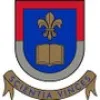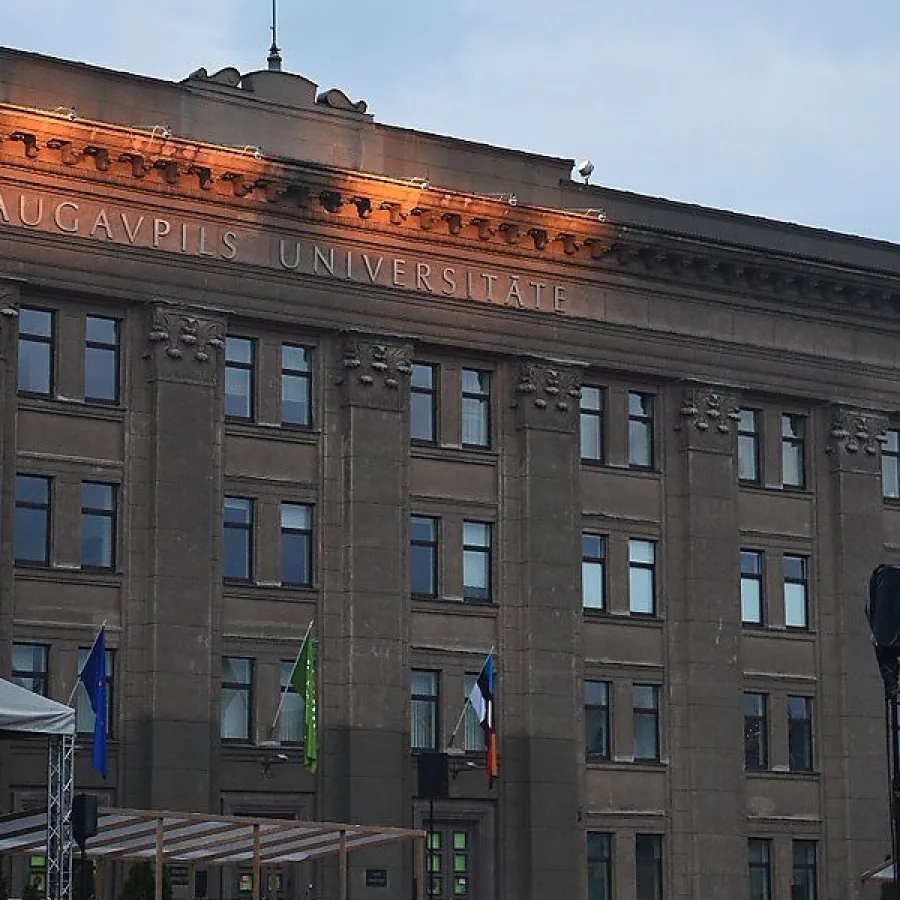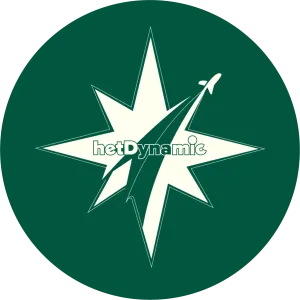Daugavpils University (DU)


Daugavpils University (DU)
The main research disciplines of DU scientists are Literary Science, Linguistics, History, Biology, Environmental Sciences, Physics, economics, Sociology, Psychology, Education, and Art. DU has thirteen research centers, and almost all of them have allocated the means of various EU projects and have purchased modern equipment (e.g. ZEISS laser scanning microscopes), which allows to conduct of high-level research in various fields. DU has a long tradition of organizing various conferences, e.g. Scientific Readings, Slavonic Readings, and various thematic conferences in all branches of science.
Description
DU has the advantage of being located in a multicultural environment. We cooperate with various institutions worldwide. Students of Daugavpils University have many opportunities to study and practise abroad, getting extra experience and a new view on knowledge received at Daugavpils University. Students can use Erasmus + mobility options to study for one or two semesters at one of the European partner universities of Daugavpils University. Students can receive Else Marie Tschermak Foundation’s funding to study or participate in different activities of high importance abroad.
Our students have a wide range of possibilities to fulfill themselves not only in studies, but also in different activities, working in the Students’ Council, Student’s Journal “Lai Top!”, Latgale Students’ Centre, joining The Association of Young Scientists of Daugavpils University “DUJZA”, Art Teacher Union, Health Care Centre, Natural Research and Environmental Education Centre. Students can also obtain a foreign language, take part in the students’ dance ensemble “Laima” and do sports at the Sports Complex of Daugavpils University. Every student, inquisitive and interested in science, has an opportunity to work in research Institutions and centers, to participate in scientific festivals or international conferences.
Courses
M.S. Biology (aquaculture, biodiversity research, or nature recreation)
Daugavpils University (DU)
Latvia, LATVIA
Attribute
Undergraduate diploma (or higher)
Bachelor’s degree in biology or chemistry, or environmental science, or healthcare, or first cycle higher professional education in the field of biology or environmental science, pharmacy or veterinary medicine
Applicants must upload education documents in their original language, as well as translations into English.
Diplomas and transcripts issued outside EU must be legalized with a legalization stamp or apostille.
You must take the original entry qualification documents along with you when you finally go to the university.
English
IELTS 5.5;
Pearson PTE Level 3 (B2);
TOEFL 72 points;
Cambridge English Language Assessment 160 points (B2);
ECL (B2);
Language Cert ESOL (B2);
Duolingo 105 points (B2).
Application fee of 200 Euros
The Aim is to prepare high-level specialists in the field of biology with deep theoretical knowledge and practical skills, capable of making independent decisions and conducting creative scientific research.
Career opportunities
Able to take initiative and responsibility, working individually or in a team, able to organize scientific work;
Able to conduct interdisciplinary research according to the master’s thesis in the sub-field;
Able to evaluate the influence of one’s competence and social environment.
M.S. Smart Economics and Innovations
Daugavpils University (DU)
Latvia, LATVIA
Attribute
Undergraduate diploma (or higher)
Bachelor’s degree or 2nd level professional higher education in economics, finance, entrepreneurship (business), management or sociology.
Applicants must upload education documents in original language, as well as translations into English.
Diplomas and transcripts issued outside EU must be legalized with a legalization stamp or apostille.
You must take the original entry qualification documents along with you when you finally go to the university.
It is necessary to have notarized certified documents translated, legalized and apostilled.
English
IELTS 5.5;
Pearson PTE Level 3 (B2);
TOEFL 72 points;
Cambridge English Language Assessment 160 points (B2);
ECL (B2);
Language Cert ESOL (B2);
Duolingo 105 points (B2).
A motivation letter must be added to your application.
motivation (online interview)
DU Admission Committee may review certain applications for studies received from graduates of Bachelor’s or 2nd level higher professional study program in other thematic areas of education, if the applicant has at least 2 years of work experience in economics, finance, business or management, confirmed by an employer’s proof of employment;
Full-time studies (1.5 year):
– Professional Bachelor degree or Second-level professional higher education (at least 4 years) in economics, finance, entrepreneurship (business), management or sociology.
Application fee of 200 Euros
Career Opportunities
The aim of the academic master’s study program is:
To provide students at the national and international level with competitive knowledge, relevant skills, and competencies for analytical evaluation of economic and financial processes in the context of smart development, emphasizing research skills for scientific and academic work and training highly qualified specialists under professional standards “Financial analyst” (profession code PS-118).
M.Sc. Economic Safety
Daugavpils University (DU)
Latvia, LATVIA
Attribute
Undergraduate diploma (or higher)
Applicants must upload education documents with the original language, as well as translations into English.
Diplomas and transcripts issued outside the EU must be legalized with a legalization stamp or apostille.
You must take the original entry qualification documents along with you when you finally go to the university.
It is necessary to have notarized certified documents translated, legalized and apostilled.
English
IELTS 5.5;
Pearson PTE Level 3 (B2);
TOEFL 72 points;
Cambridge English Language Assessment 160 points (B2);
ECL (B2);
Language Cert ESOL (B2);
Duolingo 105 points (B2).
A motivation letter must be added to your application.
motivation (online interview)
Application fee of 200 Euros
The aim of the academic master’s study program is:
To provide students at the national and international level with competitive knowledge, relevant skills and competences for analytical evaluation of economic and financial processes in the context of smart development, emphasizing research skills for scientific and academic work and training highly qualified specialists in accordance with professional standards “Financial analyst” (profession code PS-118).
PhD Management Science
Daugavpils University (DU)
Latvia, LATVIA
Attribute
Postgraduate diploma (or higher)
Master’s degree or professional master’s degree in social and humanities, business and administration, thematic area of law science or other thematic areas if the person has at least 2 years of work experience in business management, public management or education management.
Applicants must upload education documents in original language, as well as translations into English.
Diplomas and transcripts issued outside EU must be legalized with a legalization stamp or apostille.
You must take the original entry qualification documents along with you when you finally go to the university.
It is necessary to have notarized certified documents translated, legalized and apostilled.
English
IELTS 5.5;
Pearson PTE Level 3 (B2);
TOEFL 72 points;
Cambridge English Language Assessment 160 points (B2);
ECL (B2);
Language Cert ESOL (B2);
Duolingo 105 points (B2).
A motivation letter must be added to your application.
Experience is acknowledged by submitting a CV and other supporting documents if any (statements, certificates, diplomas, publications, etc.);
Examination: Research project, which is related to the applicant’s research interests and potential theme of the doctoral thesis.
Application fee of 300 Euros
The aim of the doctoral study program is
to provide high-level studies and active research work of doctoral students, to
enable doctoral students to acquire in-depth competences necessary for
independent research work and its completion with original and empirically
proven results in the field of economics and business, testifying the use of
international experience in research work and in its organization and
management.
PhD Economics
Daugavpils University (DU)
Latvia, LATVIA
Attribute
Postgraduate diploma (or higher)
Master’s degree in economics, finance, business, or management or equivalent higher education. Admission Commission can consider the applications of master’s degree holders in other thematic areas, if the person has at least 2 years of work experience in economics, finance, business, or management, presenting a certificate from the workplace.
Applicants must upload education documents in their original language, as well as translations into English.
Diplomas and transcripts issued outside the EU must be legalized with a legalization stamp or Apostille.
You must take the original entry qualification documents when you finally attend university.
It is necessary to have notarized certified documents translated, legalized, and apostilled.
English
IELTS 5.5;
Pearson PTE Level 3 (B2);
TOEFL 72 points;
Cambridge English Language Assessment 160 points (B2);
ECL (B2);
LanguageCert ESOL (B2);
Duolingo 105 points (B2).
Examination:
– Report on the research topic and discussions about it.
– Test in a foreign language (English, German, or French).
Application fee 300 Euros
CAREER OPPORTUNITIES
to give students of the program knowledge corresponding to the contemporary level of economics in the sub-branches of regional economics and finance and credit
to acquire contemporary research methods in economics;
to create optimal conditions for doctoral students’ research – opportunities to work in the library, use modern information and communication technologies, regularly participate in scientific conferences in Latvia and abroad, have in-service training in other universities and research centers, publish their papers internationally reviewed scientific editions;
to have practical training in conducting scientific research and teaching in a higher education establishment;
to provide conditions for developing and defending the doctoral thesis;
to promote the introduction of the latest findings and theories in economics in state and local government institutions, organizations, and commercial companies.
As a result of the program’s acquisition, the graduate will acquire and be able to demonstrate:
Knowledge:
Students can demonstrate that they:
know and understand topical scientific theories and findings in economics;
know research methodology and contemporary research methods in the branch of economics, including sub-branches of regional economics, finance, and credit;
know the terminology of economics in English.
Skills:
Students can:
independently evaluate and select methods adequate for scientific research in economics;
apply the acquired theoretical knowledge to the particular research theme;
at conducting original research, contributing to expanding the scope of knowledge, or creating a new understanding of the current knowledge in economics;
critically analyze the obtained research results, prepare them for presentation at international conferences and publications in internationally reviewed editions;
regularly improve scientific qualifications, implement scientific projects, and carry out research and development tasks in various institutions and organizations.
Competence:
Students can:
solve important tasks relating to research or innovations in the branch of economics by making independent, critical analyses, syntheses, and evaluations;
independently put forward the research idea and relate the research theme to topical development tendencies in the theory of contemporary economics;
use the opportunities provided by modern information and communication technologies to achieve the research goals;
plan, structure, and manage large-scale scientific projects, including international ones.
Doctoral students have possibilities:
to publish their articles in the journal “Regional Report”, „Social Sciences Bulletin” and the annual collections of research articles;
to participate in annual Doctoral students’ scientific conferences:
in 2011 on the theme “Development Strategy of Inter-Regional Economic Integration in the EU Conditions”;
in 2012 on the theme “Influence of Financial Capital on the Improvement of Competitiveness of Regional Economics”;
to have in-service training in the universities and research institutes in Lithuania, Poland, Germany and other countries;
to receive a scholarship if the student studies for the state budget means.
PhD Psychology
Daugavpils University (DU)
Latvia, LATVIA
Attribute
Postgraduate diploma (or higher)
Master’s degree in Psychology;
Research paper on the theme of Doctoral Thesis (completed applicant’s form) and the discussion on it;
examination in a foreign language (English, German, or French
Applicants must upload education documents in their original language, as well as translations into English.
Diplomas and transcripts issued outside the EU must be legalized with a legalization stamp or Apostille.
You must take the original entry qualification documents when you finally attend university.
It is necessary to have notarized certified documents translated, legalized, and apostilled.
English
One of the next variants, if you have no any of these certificates you can pass University or Baltic Center Exams:
English
TOEFL IBT – at least score 72;
IELTS – at least score 5.5;
PTE General – at least level B2;
FCE – at least level B;
CPE – satisfactory pass;
CAE – satisfactory pass.
A motivation letter must be added to your application.
Examination:
– Research paper on the theme of Doctoral Thesis (completed applicant’s form) and the discussion on it.
– Examination in a foreign language (English, German, or French).
Application Fee €400 one-time
CAREER OPPORTUNITIES
The tasks of the study program:
theoretical – to ensure a high level of theoretical training for doctoral students, which would be in conformity with requirements of psychology science contents in the world and in Latvia;
research – to develop a system of skills and acquirements of organization of scientific research and analysis of results;
methodological – to foster a system of skills and acquirements of delivering lectures and other kinds of activities for doctoral students;
practical – to improve skills in collecting scientific data and to form skills of results’ implementation in everyday life, during delivering lectures, managing seminars, etc.
As a result of the program’s acquisition, the young scientist will acquire and be able to demonstrate:
Knowledge.
The doctoral student is able to show that he/she is aware of and comprehends the most topical scientific theories and cognitions knows research methodology and modern research methods in a branch of psychology science, professional field and contiguity of various areas.
Skills.
The doctoral student is able to evaluate and elect independently corresponding methods for scientific research, contribute to widening knowledge borders, and have given new comprehension of existent knowledge and their application in practice, by implementing vast original research, part of which is on the level of internationally citated publications. The student is able to communicate both orally and in writing about the field of his/her scientific activities with the wider scientific community and society in general. The student can improve independently his/her scientific qualification, implement scientific projects, and gain achievements in conformity to international criteria of psychology branch, manage psychological tasks in enterprises, institutions, and organizations.
Competence.
Doctoral students can tackle significant research or innovations-related tasks, independently put forward the idea of research, plan, structure, and manage big scientific projects in an international context by doing independent, critical analysis, synthesis and evaluation.
The program is implemented at the Faculty of Social Sciences, Department of Psychology, and the Institute of Social Research.
Doctoral students have possibilities:
to study under the guidance of professional and experienced university lecturers;
to publish their articles and research results in the local periodical publications and annual collections of research articles;
to participate in annual scientific conferences at Daugavpils University and other higher educational establishments, as well as in conferences at European and global levels;
to participate in international student exchange programs and study at higher educational establishments abroad;
to participate in the implementation of projects related to the theme of research;
to receive a scholarship if the student studies for the state budget means.
PhD Educational Sciences
Daugavpils University (DU)
Latvia, LATVIA
Attribute
Postgraduate diploma (or higher)
Master’s degree in education, pedagogy, psychology or master’s degree in humanities, social sciences, medicine, sports, and natural sciences or equivalent higher education and at least two years of pedagogical work experience in an educational institution.
Applicants must upload education documents in their original language, as well as translations into English.
Diplomas and transcripts issued outside the EU must be legalized with a legalization stamp or Apostille.
You must take the original entry qualification documents when you finally attend university.
It is necessary to have notarized certified documents translated, legalized, and apostilled.
English
IELTS 5.5;
Pearson PTE Level 3 (B2);
TOEFL 72 points;
Cambridge English Language Assessment 160 points (B2);
ECL (B2);
LanguageCert ESOL (B2);
Duolingo 105 points (B2).
A motivation letter must be added to your application.
Examination:
Interview – during the interview, the candidate has to present a five to ten-minute report on the intended research topic.
Application Fee €300 one-time
CAREER OPPORTUNITIES
Learning outcomes:
The results of the study program are formulated in accordance with the European Qualifications Framework3 (EQF) the Latvian Qualifications Framework4 (LQF) level 8 and the European Higher Education Area Qualifications Framework third cycle qualification level.
Knowledge:
- understands the historical experience and current trends in the development of educational sciences and their context in Latvia, Europe, and the world;
- understands the current scientific theories and knowledge of educational sciences and the context of their formation;
- understands theoretical and empirical research methods and methodologies in the field of educational sciences and contact with other fields of sciences, interdisciplinary approach in research;
- understands the role of a researcher in the field of educational sciences in the development of society, and in solving educational problems in the context of comparative education policy.
Skills:
- systematically analyzes and interprets binding concepts, theories, and topicalities of educational policy in educational sciences;
- independently evaluates and reasonably chooses methods appropriate for scientific research in educational sciences;
- independently uses theories of educational contact sciences, and research methods to carry out research activities in the field of education in an international comparative context;
independently formulates and critically analyzes research problems at different levels of education;
- identifies potential connections between the theoretical aspects of educational sciences and their implications in educational policy, and pedagogical practice in the local and international.
Contact Hetdynamic Ltd now for
Guidance
Apply for Daugavpils University (DU)

